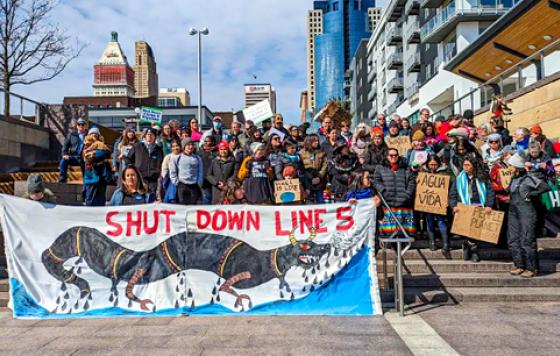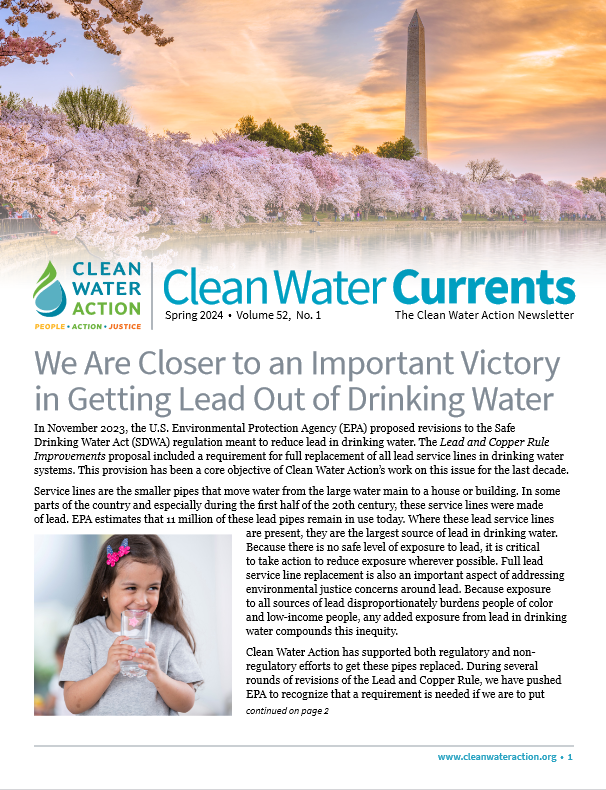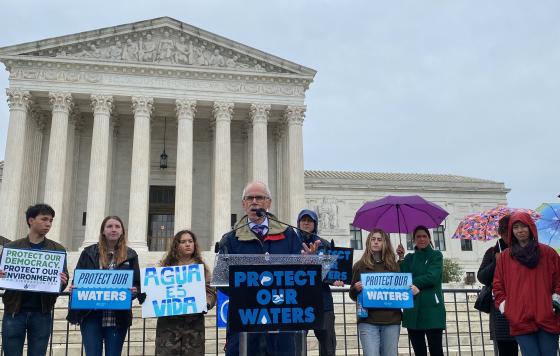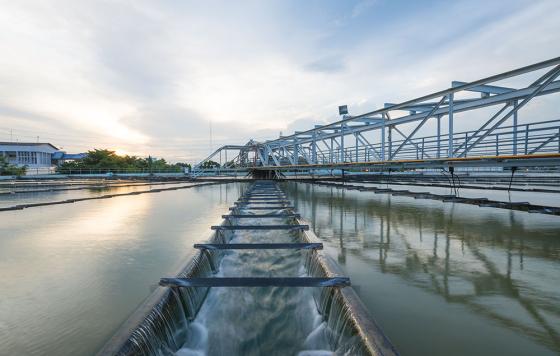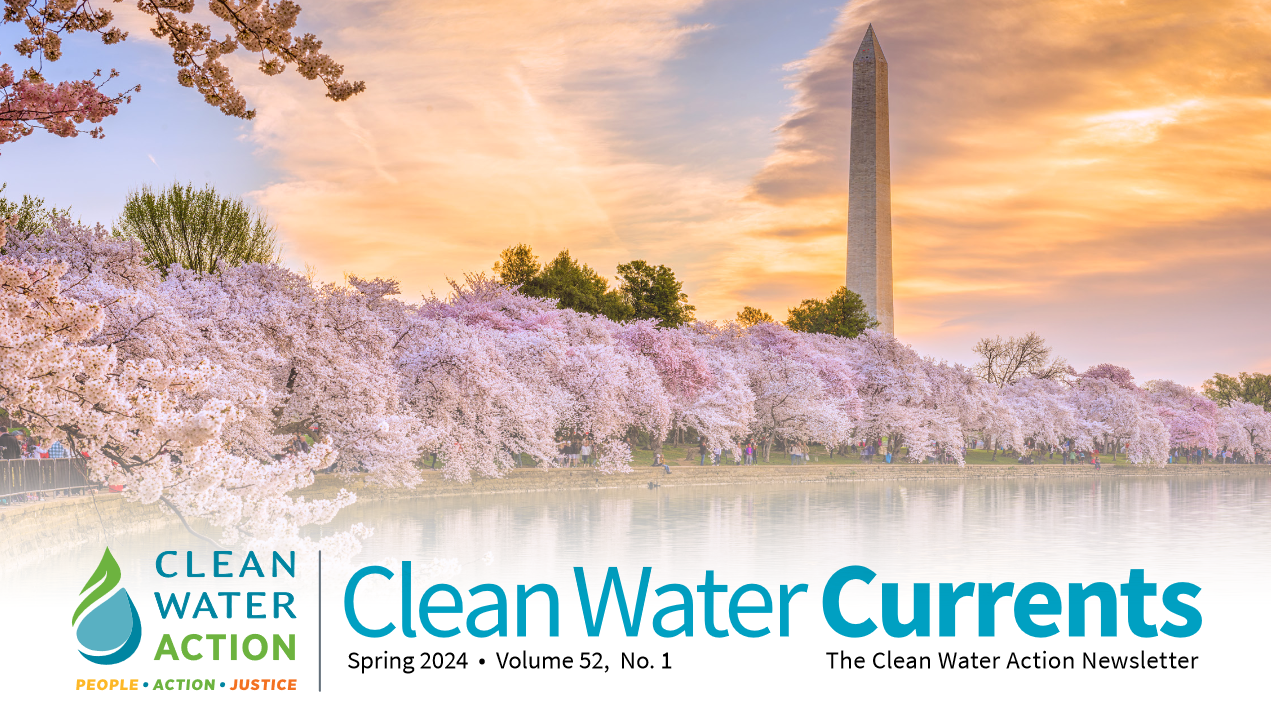
In This Issue:
National News
- We Are Closer to an Important Victory in Getting Lead Out of Drinking Water
- Update From Jeff Carter, President & CEO
- State Infrastructure Programs - New Report Finds Opportunities to Improve Transparency and Accessibility
- News Updates
- Protecting Water After the Devastating Sackett v. EPA Supreme Court Decision
State and Regional News
- California
- Chesapeake (DC, Maryland, Virginia)
- Michigan
- Minnesota
- New England (Connecticut, Massachusetts, Rhode Island)
- New Jersey
- Pennsylvania
- Texas
- Download a PDF of this issue
We Are Closer to an Important Victory in Getting Lead Out of Drinking Water
In November 2023, the U.S. Environmental Protection Agency (EPA) proposed revisions to the Safe Drinking Water Act (SDWA) regulation meant to reduce lead in drinking water. The Lead and Copper Rule Improvements proposal included a requirement for full replacement of all lead service lines in drinking water systems. This provision has been a core objective of Clean Water Action’s work on this issue for the last decade.
Service lines are the smaller pipes that move water from the large water main to a house or building. In some parts of the country and especially during the first half of the 20th century, these service lines were made of lead. EPA estimates that 11 million of these lead pipes remain in use today. Where these lead service lines are present, they are the largest source of lead in drinking water. Because there is no safe level of exposure to lead, it is critical to take action to reduce exposure wherever possible. Full lead service line replacement is also an important aspect of addressing environmental justice concerns around lead. Because exposure to all sources of lead disproportionately burdens people of color and low-income people, any added exposure from lead in drinking water compounds this inequity.
Clean Water Action has supported both regulatory and non-regulatory efforts to get these pipes replaced. During several rounds of revisions of the Lead and Copper Rule, we have pushed EPA to recognize that a requirement is needed if we are to put lead service lines behind us. We welcomed EPA’s announcement and participated in the sixty-day comment period to ensure that EPA received robust support for the proposal. Our activities included mobilizing Clean Water Action members and others to comment to EPA, providing verbal testimony during a public hearing, and submitting written comments.
EPA’s proposal is an important contribution to fulfilling the commitments to reduce lead hazards and protect public health in the Biden-Harris Lead Pipe and Paint Action Plan. If the requirement is finalized as proposed, the vast majority of lead service lines will be replaced within ten years of the new regulation’s implementation. The effort will be supported by $15 billion in targeted funding made possible by the bipartisan Infrastructure Investment and Jobs Act and we will continue to advocate for increased federal investment in this critical drinking water improvement. EPA is expected to finalize the proposal later this year.
Update From Jeff Carter, President & CEO

It’s hard to believe I am approaching my first annual anniversary with Clean Water Action and Clean Water Fund. I wanted to take a moment to share some reflections on the past year.
My focus during these first 12 months has been on evaluating the overall health of the organization and thinking about “big picture” issues to better define our vision, priorities, and overall messaging.
I have traveled extensively to our state offices across the country, and it is during these trips that I find the most inspiration. As I write this, I am preparing for an all-day regional retreat with our state teams in New England. I cannot wait to meet the new staff members in those states and learn more about the campaigns underway across the New England region.
In February, I attended a particularly motivating weekend retreat with our New Jersey team. It was a pleasure to meet the exceptional new staff members working in that office and learn about their efforts to mobilize communities on environmental justice issues in key areas of the state.
In March, back in D.C., I was thrilled to attend a special screening of the documentary Bad River, which focuses on the Line 5 pipeline. Our Michigan State Director, Sean McBrearty, who serves as the campaign coordinator for Oil and Water Don’t Mix, which is leading the fight against Line 5, spoke about the efforts to shut down this dangerous pipeline. I am proud that Clean Water has been at the forefront of this movement.
Later in the month, I was invited by the Anacostia Park Foundation, through our partnership with the Anacostia Parks and Community Collaborative (APACC), to a screening of the 2014 documentary An American Ascent. This film chronicles the first African American expedition to Denali, the highest peak in North America. The room was filled with community leaders working towards protecting and providing access to green spaces in Washington, D.C. It was an honor to be there, not only for the powerful film, but also to connect with grassroots groups and neighborhood leaders in my hometown who are fighting against environmental injustice. Their work is truly heroic, and I am proud to stand with them.
Get ready for an amazing year ahead with Clean Water in 2024! Keep an eye out for important information about our 2024 Annual Member Meeting on June 13th, from 7:00 – 9:00 pm ET (virtual), where we will focus on the 2024 Election. Join us for an engaging conversation with our expert panel, who will enlighten you on our work in battleground states like Michigan and Pennsylvania.
Thank you for your activism, support, donations, membership, and dedication. Together, we can continue to fight for our water, health, and environment.
On December 13, Clean Water Action and Clean Water Fund released Equitable and Effective Water Infrastructure Spending: Increasing Transparency and Accountability in State Revolving Fund Programs. Clean Water Action and Clean Water Fund assessed State Revolving Fund (SRF) programs to develop a snapshot of their accessibility and transparency and to identify areas of potential improvement.
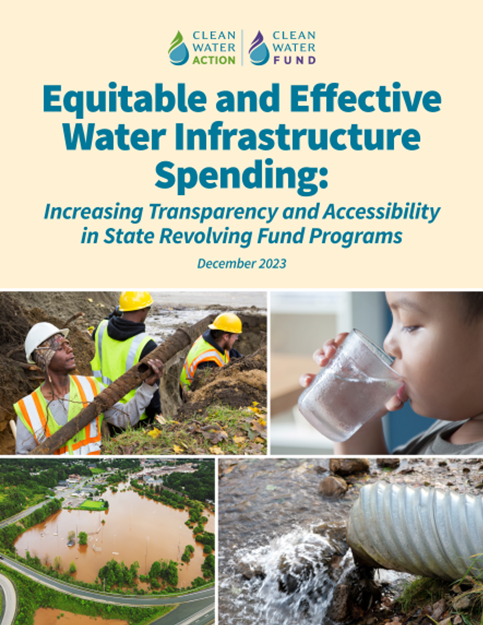
SRF programs are responsible for distribution of most of the historic water infrastructure funding made possible by the 2021 bipartisan Infrastructure and Investment Act (IIJA). To meet IIJA goals of effective and equitable distribution of water infrastructure funds, SRF programs need to be accessible and transparent in order to dramatically broaden and diversify the number of communities and projects applying for funding.
Clean Water’s analysis of the programs looked for areas of potential improvements to accessibility and transparency in how States run their SRF programs. The report made several observations with clear solutions that States can implement to better improve the transparency and accessibility of their programs.
Clean Water’s findings include:
- 20% of State SRF websites were not reasonably navigable (took more than five clicks or five minutes to reach an Intended Use Plan from the department or investment authority main page).
- 26% of States provided no information on how to apply for funding on their websites.
- 22% of States provided no personal contact on their websites to acquire more information on their programs.
- 58% of States’ programs provided very little or no information on what projects have been funded.
States and EPA can use this report to better understand how to easily improve their SRF programs to meet the new requirements in the Bipartisan Infrastructure Investment and Jobs Act.
EPA Finalized Drinking Water PFAS Limits - The U.S. Environmental Protection Agency (EPA) today finalized drinking water limits for six of the notorious PFAS chemicals, which are used in a wide variety of products and have been found in drinking water sources nationwide. EPA has followed up on Biden Administration commitments to address PFAS chemicals in light of growing evidence of their link to adverse human health effects and their widespread occurrence in water. Read our official press release HERE!
Worst Case Rule: EPA unveiled significant protections against worst-case hazardous chemical discharges, following years of advocacy and litigation by environmental justice groups and frontline communities. This regulation, which is more than thirty years overdue, fills critical gaps in the nation’s environmental safety net, requiring facilities to develop comprehensive plans to prepare for and respond to worst-case chemical discharges near waterways.
ReThink Disposable — Lights, Camera, Plastic? We’re excited to tell you about a new campaign we’ve joined with the non-profit organization Habits of Waste! “Lights, Camera, Plastic?” aims to influence producers, writers, directors, and set decorators in Hollywood to use reusable items on screen instead of single-use plastic items wherever possible. Join Clean Water Action, ReThink Disposable, and Habits of Waste in urging Hollywood to make the shift. Together, we can create a ripple effect that inspires everyone to be more sustainable in their everyday lives. Take Action!
Low-Income Household Water Assistance Program Funding: In October Clean Water Action spearheaded a letter joined by 150+ other organizations urging Congress not to discontinue this critical program that helps households pay drinking water, sewer, and stormwater bills.
Protecting Water After the Devastating Sackett v. EPA Supreme Court Decision
As we reported last year, the U.S. Supreme Court’s May 2023 decision in Sackett v. EPA significantly weakened the reach of the Clean Water Act, our nation’s 50-year-old water pollution control law. This decision has restricted the Environmental Protection Agency’s (EPA) ability to safeguard wetlands and other critical waters from pollution or destruction. Instead, the Supreme Court has invited fossil fuel and mining companies, real estate developers, and industrial agriculture to pollute, bulldoze, fill in, or drain these invaluable water resources.
While it’s too soon to predict the full impact of this disastrous decision, we do know at least half of our nation’s remaining wetlands are no longer protected by the Clean Water Act. Streams that don’t flow year-round — which are the majority of streams in many parts of the arid west — are also at risk of losing protection.
The tough reality we now face is that the Clean Water Act is no longer able to work as Congress originally intended. Congress passed the Act in 1972 with an objective to “restore and maintain the chemical, physical, and biological integrity of the Nation’s waters.” It’s simply not possible to achieve that objective without strong protection for wetlands and streams. Clean Water Action will work on multiple strategies to protect as many of our water resources as possible. Examples include:
- Building support for a long-term solution: On October 18, 2023 — the 51st anniversary of the Clean Water Act — members of the U.S. House of Representatives introduced the Clean Water Act of 2023 (H.R. 5983). This bill would restore protection to vital water resources that were lost as a result of the Sackett v. EPA Supreme Court decision. Ultimately, the U.S. Congress needs to clarify the intent of the landmark Clean Water Act and we need to build broad and strong support to win this priority campaign. You can help by taking action today to urge your U.S. Representative to support this bill that would protect water quality and our drinking water.
- Improve water protection in states: While we need a federal commitment to protecting all of our water resources, states can play a role. In states with robust wetlands protections, we can push for improved funding and enforcement. In other states, we can work to win protections for streams and wetlands.
- Putting drinking water first: If we made impacts on drinking water a primary concern in decisions about protecting water, we definitely would not leave the health of wetlands and streams to the whims of polluters. These water bodies play a critical role in protecting drinking water sources downstream. We will elevate the science behind the imperative to restore protections and the benefits for drinking water, wildlife, and community quality of life.
Photo: Concertgoers saying “cheers!” to
ReThink Disposable at The Warfield.
Legislative Priorities
We’re looking forward to this election year with a busy legislative session and are sponsoring several important bills. Maybe most exciting is SB903 (Senator Skinner), which would ban nonessential uses of PFAS throughout the state, and AB2761 (Assemblymembers Hart, Lowenthal), which would ban the use of PFAS and PVCs from plastic packaging. After experiencing an unusually average water year, we’re continuing our work to ensure equitable and sustainable groundwater management with AB 828 (Assemblymember Connolly), which would allow small communities and managed wetlands to continue accessing groundwater for their basic needs. We continue to look for ways to ensure that water rates are affordable for California families — our advocacy efforts recently generated nearly $450 million in funding to settle water debt accrued during COVID. We also received a Community Action Grant from the California Air Resources Board to help empower the overburdened community of Lost Hills to create a plan to reduce the impact of air contaminants on their residents.
ReThink Disposable
We’re also making huge strides helping local communities. Our ReThink Disposable program has expanded to the world of music venues, kicking off this new venture with historic locations like The Filmore, August Hall, and The Warfield.
Anacostia Park in DC
Clean Water Action is gearing up for spring and summer activities in Anacostia Park! As part of the Anacostia Park and Community Collaborative, we are working to highlight a little-known national park alongside the banks of the Anacostia River and advocate for investments and improvements. This urban park is accessible to residents in DC’s most underserved communities and provides an opportunity for people to build connections with each other and the natural environment. Activities include birdwatching, stream hikes, and plenty of roller-skating, among others.

MD: Legislative Updates
Our Maryland office is quite active during Maryland’s 90-day legislative session, which ends on April 8. Our priorities this year include ending renewable energy subsidies for burning trash, improved public disclosure of Superfund sites and their risks, expanding grant opportunities for compost, and continuing to educate legislators about the critical need to invest in better septic systems. We are also working with schools to help them navigate Maryland’s program for in-school compost and food waste reduction, a program enabled by legislation we helped pass in 2022.
Photo: Crewmembers from Howard EcoWorks install a septic garden in 2023. This project was funded by the Chesapeake Bay Trust and Howard County. PHOTO COURTESY WILLIAM BECK
Photo: Clean Water Action staff and volunteers with the Oil and Water Don’t Mix coalition rallied in Ohio in March as Line 5 was being heard in US District Court.
Legislative Priorities
Our Michigan team is continuing to work in the state legislature to pass the polluter pay and water affordability legislation that we spent the better part of 2023 working with bill sponsors to craft and introduce. We should have the votes to pass these bill packages and continue our work to ensure that these are prioritized by legislative leadership.
Our campaign to shut down Enbridge’s Line 5 pipeline continues. In March, a documentary called Bad River aired in 12 major cities nationwide. The film chronicles the history of the Bad River Band of Lake Superior Chippewa from the treaty they signed in the 1800s through their ongoing fight for their sovereignty and to shut down Line 5 on their reservation lands in northern Wisconsin. It is a deeply inspiring film that is getting a lot more people across the country looking at the dangers we face from Enbridge and their unnecessary and unsafe Line 5 pipeline. We are proud to stand with the Bad River Band as we work together to shut down Line 5 before a catastrophic rupture of the pipeline changes the Great Lakes forever.
Taking Back Our Power
From holding polluters accountable to ensuring that environmental justice is prioritized in climate legislation and our ongoing work to shut down the Line 5 pipeline, so many of the problems we work to solve have been made more difficult to solve due to the corrosive impact of corporate money on our political process. That’s why in February, Clean Water Action and partner organizations from across the state launched the Taking Back Our Power coalition. Taking Back Our Power aims to pass legislation that would prohibit regulated utilities like DTE and Consumers Energy and all government contractors from spending money to influence our elections. If these policies are enacted, research shows that it would remove between 70% and 90% of the corporate dark money that is currently spent influencing our elections. We are excited to get this campaign underway and reform our political process in Michigan to ensure that the broadly popular policies we fight for have a greater chance of being enacted by our elected leaders.
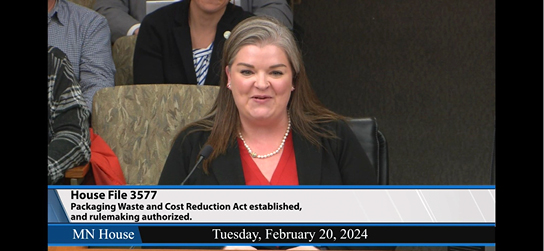
Photo: Minnesota State Director Avonna Starck testifying on
legislation to reduce plastic waste.
Legislative Updates
We have a shortened legislative session. We’re seeing progress with a few bills including SF3427/HF3320, which creates an extended producer responsibility program that would keep more than six million pounds of boat wrap plastic out of Minnesota landfills. SF4114/HF3989 brings Minnesota into alignment with every other state in the nation, other than New York, by removing the requirement for flame retardants in tents. This bill is supported by firefighters across the country because new, synthetic tents do not burn — they melt. Flame retardants on synthetic tents burn and the fumes are harmful to fire fighters and others when they are breathed in. We are also fighting hard for a hearing for SF3541/HF3345, which repeals Minnesota’s preemption on plastic bag bans. We believe cities and counties should be able to take action regarding plastic bags if that’s what is best for their community!
Healthy Homes
Our Healthy Homes presentations are in full swing thanks to a grant from Hennepin County, the state’s largest county. We are meeting community members on their turf to help them understand the toxic chemicals they encounter every day while shopping, cooking, cleaning, and making home improvements. This grant has allowed us to identify vulnerable communities and hand out 240 reusable bags filled with nontoxic, safe cleaning alternatives. These samples will help families across the state switch to sustainable options, which protect their families!
NEW ENGLAND (Connecticut, Massachusetts, Rhode Island)
CONNECTICUT
PFAS
Clean Water Action is excited to share that our bill to ban toxic PFAS in a wide range of products (Senate Bill 292) has been introduced in the General Assembly. This legislation bans the use of PFAS in certain items sold in Connecticut including apparel, rugs and carpets, cleaning products, cookware, cosmetics, dental floss, fabric treatments, children’s products, menstrual products, ski wax, textile furnishings, and upholstered furniture. Phasing out toxic PFAS protect waterways, our health, and the health of the communities where PFAS are manufactured, used, and disposed of.
Now, we are working to make sure that this legislation passes, so Connecticut can join the nationwide momentum to get these toxic “forever chemicals” out of products. Clean Water Action staff and members joined environmental allies at the State Capitol in March to advocate in person, and Connecticut’s State Director Anne Hulick testified in a legislative hearing! You can help! Please send a message to your elected officials!
MASSACHUSETTS
Toxics
We are excited to report that both of our bills to protect Massachusetts residents from toxic chemicals, the Toxic Free Kids Act and An Act to protect Massachusetts public health from PFAS, have passed favorably out of their committees and are continuing to progress through the legislature. Clean Water Action will continue to advocate for strong language in the final PFAS bill that bans these toxic “forever chemicals” in childcare products, personal care products, firefighters’ personal protective gear, and rugs/carpets and that ultimately phases out most uses of PFAS in Massachusetts. Thank you to all our members who have sent messages to your elected officials!
Clean Air and Climate Justice
World Asthma Day is May 6th! Clean Water Action is working with our allies to plan an asthma justice rally in Roxbury supporting the passage of clean air legislation in Massachusetts. Residents living in environmental justice communities are disproportionately impacted by poor air quality from cars, trucks, trains, boats, and planes in their neighborhoods. We're pushing for legislation to require expanded outdoor air monitoring and the setting and achieving of ambitious air quality targets.

Youth Action Collaborative
Our Youth Action Collaborative has launched! Students at Malden High School are meeting weekly to engage with Clean Water leaders and each other on environmental issues with a focus on local justice campaigns. The students are inspiring! If you ever feel climate despair, know that today’s youth are tomorrow’s leaders, and they are curious, informed, and preparing to fight for change!
Photo: Malden High School students participating in the Youth Action Collaborative work on mapping their collective knowledge of climate change.
Plastic Pollution
Clean Water Action is continuing to lead coalition efforts to fight plastic pollution in our coastal waters. In response to last summer’s headlines about tons of microplastic pollution on the floor of the Narragansett Bay, we are supporting legislation this session to ban intentionally added microplastics from products and require the RI Department of Environmental Management to create a plan to test and monitor water for microplastics. To clean up this plastic mess, we need to know where the microplastics are coming from!
We’re also working to take on plastic pollution at its source. Our ReThink Disposable program is signing up restaurants and institutions interested in phasing out single-use disposable foodware like plastic cups, forks, and plates! You can nominate your favorite restaurant here! We are also excited to report that the RI Bottle Bill Study Commission had productive meetings all winter. All parties agree that we have a waste and plastic pollution problem. Now, we’re beginning to hash out the details of what a RI bottle bill will look like.
PFAS
We’re excited to report that S2152/H7356, the Comprehensive PFAS Ban Act of 2024, has been introduced in the Rhode Island General Assembly! This bill phases out the sale of residential carpets or rugs, fabric treatments, cosmetics, cookware, juvenile products, apparel, and menstrual products containing intentionally added PFAS and, critically, phases out the use of toxic PFAS in firefighting foam and moves the state closer to phasing these toxic substances out of firefighting protective equipment. Rhode Island is joining regional and national momentum to protect waterways, our health, and the health of the communities where products containing PFAS are manufactured and disposed of. You can help! Send a message to your elected officials!
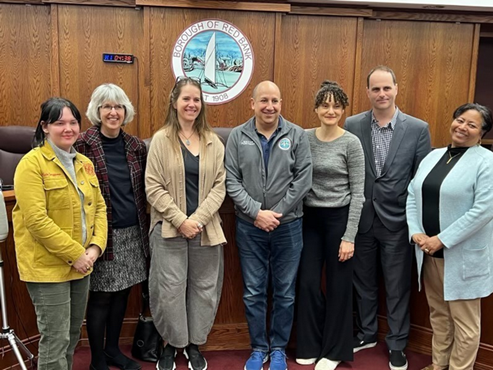
Photo: Clean Water Action Staff, Red Bank Mayor (center) and Council Members after signing their municipal Skip the Stuff ordinance. Garwood NJ passed a similar ordinance.
Skip the Stuff
Organized by Marta Young, Clean Water Action’s Zero Waste Specialist, NBC’s Ted Greenberg ran a story highlighting Clean Water Action’s Skip the Stuff campaign which aims to reduce cutlery and condiment pollution. It aired on Friday February 2 in Philadelphia, New York, and in New Jersey (channels NBC4 and NBC10). Clean Water Board Members Nancy Facey-Blackwood and Ben Forest were interviewed as well. As Red Bank Council Members, they cast affirmative votes for their local Skip the Stuff ordinance, and on March 14th it passed without opposition.
Jersey City Victory
The Jersey City Council unanimously passed a resolution that Clean Water Action put forth, demanding crucial emission controls for the Diversified Global Graphics’ Group (DG3) near Liberty State Park! This historic achievement underscores the power of community advocacy and collective action. The petition signatures we gathered played a pivotal role in this success, demonstrating the strength of our unified voice in safeguarding the well-being of vulnerable Jersey City residents. We are now dedicated to securing an agreement from the NJ Department of Environmental Protection (NJDEP) for a second hearing and extension, as well as a more robust public process for future pollution permits that do not fall under the state EJ law.
Power Plant Plans Paused
NJ Transit is putting the brakes on a controversial plan to build a power plant in Hudson County! Clean Water Action and allies are now demanding the same for a similar proposal in Newark regarding the PVSC gas plant. On January 26th, NJ Transit announced that it will be “redirecting” $503 million in federal grant funds that were previously earmarked for the TransitGrid Microgrid Central Facility in Kearny. The backup power plant — which saw opposition from local environmental activists for years — would have been fueled by fracked gas.
Greening Black and Brown Neighborhoods
As part of our Resilient Community Stormwater Initiative, our Philadelphia office held a community event on Greening Black & Brown Philadelphia. This event was a call-to-action and a celebration of the inspiring leaders driving change in Philadelphia's least served Environmental Justice Communities. It brought together around 150 community leaders and diverse voices for an afternoon of presentations, dialogue, and networking on developing greener, more equitable and more sustainable neighborhoods throughout the city.
EPA Investing in Cleaner Air
Using new funding from federal legislation, EPA is investing in protecting community health in environmental justice communities in PA. Clean Water Fund is launching a new community air monitoring project in Philadelphia focused on neighborhoods near the former Philadelphia Energy Systems refinery. In Pittsburgh, Clean Water Fund is a partner to a similar project to deploy community air monitors in the industrial Mon Valley. These projects are part of $4 million in grants EPA made across PA to improve air monitoring in neighborhoods that are most at risk for poor air quality and health disparities.
Oil and Gas Oversight
This year, oil and gas risks to water resources are in the spotlight in Texas, where Clean Water has decades of history. Our expertise and past work around the Safe Drinking Water Act Underground Injection Control (UIC) Program makes us well-positioned to have an impact as key aspects of the program are debated. We have joined as a steering committee member of the Texas Carbon Capture & Storage Community Advocacy Coalition. Among the concerns about inadequate oversight and industry capture are lax implementation of the existing UIC Class II program that oversees wastewater injection wells and a type of oil and gas extraction known as Enhanced Recovery. As our state’s oil and gas regulatory agency, confusingly named the Texas Railroad Commission, is currently applying to take control of permitting, regulating, and enforcing — primacy — over another type of carbon dioxide injection project known as Class VI injection for permanent disposal of CO2, our coalition will focus efforts to oppose EPA’s handing over the reins to the Texas Railroad Commission and continue to administer that program.

Spring for Water
In lighter news, Spring for Water Benefit & Bash, Clean Water Action and Fund’s annual Austin-area event will take place on Saturday, April 27th, 4-8pm at local jewel, Chez Zee American Bistro. Please join us as a sponsor or attendee and enjoy delicious food and beverages, meeting local and elected leaders, and valuable silent and live auction items donated from Austin’s finest local establishments.


